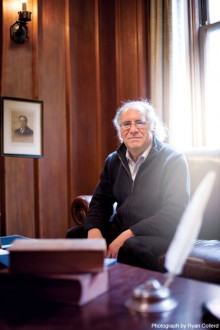The Raab Collection: Philly’s Custodians of History
The Raab Collection has a lot in common with other family businesses: a dad (Steven Raab) who founded it, a mom (Susan) who helps run it, two sons who embarked on other careers after college (Jonas, journalism, and Nathan, politics) before returning to the fold. But instead of dealing in widgets or pool maintenance, the Raabs are, as Jonas says, “custodians of history”—buyers and sellers of rare autographs and artifacts. Name an important one that’s come up for sale in the past 20 years—a letter from Susan B. Anthony decrying the treatment of women as “pets,” even the original copy of the Kennedy Assassination Air Force One tape—and it’s likely to have passed through Raab hands.
Steven, 64, was bitten by the bug as a boy, after he was given a comic book about Abraham Lincoln and began collecting Civil War memorabilia. He became a lawyer, but he never stopped collecting, and eventually decided to make the hobby his lifework.
“Collectors are people who care about history and aren’t content to just read about it,” Nathan says. “They get a special thrill when holding something Lincoln touched.”
Once they’ve felt that thrill with Lincoln, they long to feel it with Ulysses S. Grant.
In their elegant Ardmore and Center City showrooms, the Raabs père et fils sit down with the descendants of presidents, scientists and literary lions, laboring to provide context—and a price tag—for, say, Christmas cards from Hemingway.
“We’re looking for pieces,” Steven says, “that have a story to tell.”
A routine John Hancock by John Hancock may be worth $4,000; the same signature on a letter authorizing his own paycheck as governor of Massachusetts might fetch $20,000.
The Raab boys grew up taking summer vacations to Civil War battlegrounds; bedtime stories were about the London Blitz. As you might expect, the whole family watches Antiques Roadshow and Pawn Stars.
“I’ve gotten to where my guesses are within 20 percent even on the non-autograph stuff,” says Steven.
There used to be a “farm system” for autographs: Teddy Roosevelt would become less available, but then Truman would replace him on the covet-o-meter, and so on.
Those days are gone: “The last president to sign his own letters was Kennedy,” Steven says. The Raabs must navigate a world filled with forgeries and autopens and secretaries diligently copying signatures.
Nathan notes an exception: “Barack Obama writes letters.”
“Handwrites them,” Steven adds admiringly.
But the rest of us, even the historically important among us, rely on email and text-messaging. The Raabs can’t entirely regret this revolution, since the Internet has grown them from a small family business to a national force. They’re now as likely to get a call from South Dakota or California as they are from Pennsylvania.
Items do get added to the pipeline, with families selling treasured mementos to pay college tuition or hospital bills.
“I had a client who had the autographs of every president up through Franklin Roosevelt. Then he decided he’d rather have a Porsche,” Steven says.
And then there are the optimists: people who think they’ve found an original copy of the Gettysburg Address. Steven has learned this rule: “The more obvious the reproduction, the more intensely believing the owner is.”
This story originally appeared in the April issue of Philadelphia magazine.



